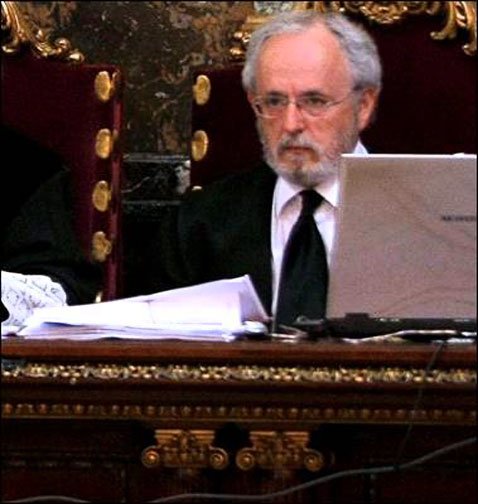The Spanish anti-corruption pressure group ACODAP has laid an official complaint against the appointment of Supreme Court judge Luciano Varela, one of the seven judges who tried and convicted the 12 Catalan pro-independence leaders in the 2019 trial. ACODAP, formed by judges and experts in different fields, and chaired by judge Fernando Presencia argues that "the decision to maintain Luciano Varela as a member of the court in the Catalan leaders' trial was illegal and full of falsehoods."
The standing committee of Spain's senior judicial organ, the General Council of the Judiciary, agreed to permit Varela, a Supreme Court judge, to continue to be part of the chamber that tried the Catalan politicians and civil leaders, despite his status as having retired. According to ACODAP's complaint, the committee "tried to illegally prevent the trial from being overturned and having to be repeated."
In the complaint lodged with the corresponding duty court, ACODAP states that: "it was when the age of Luciano Varela was made public that the improvisation began, because until then no one had noticed the problem that would be created in the pro-independence leaders' trial, given that retired judges can only be empowered to issue a sentence, not to continue working as if they were active judges". "It didn't make sense," the complaint continues, "but Manuel Marchena, presiding judge of the Supreme Court's criminal chamber, allowed Luciano Varela to continue in the trial, as he knew that being retired, would make it necessary to annul the entire proceedings up to that time".
For this reason, judge Presencia says that "the agreement to enable Luciano Varela was taken precisely at the request of Marchena, who incorrectly requested the application of Article 256 of the Law of Judicial Power (LOPJ), which states that once a magistrate has retired, he is only authorized to 'deliberate, vote, draft and sign the sentences, for the hearings that he had attended and had not yet been ruled upon', but that under no circumstance was a retired judge authorized to continue to serve on the court as if he were an active judge, which is not the case."

Judge Fernando Presencia, president of ACODAP. / ACODAP
Thus, according to ACODAP, "the standing committee decided that Varela would continue to form part of the court in an irregular way during the entire pro-independence leaders trial, contrary to the provisions of the LOPJ, while also receiving the payments due to him as a retired judge without having the dignity or the authority of an active judge, a group of which he was no longer a part as of his retirement."
As the complaint states, "What occurred with Luciano Varela was unprecedented and has never happened in the Spanish judiciary in the entire history of democracy: a retired judge forming part of a court of justice and prosecuting a case like the independence trial "without having the status of an active judge. In Spain (unlike Portugal), judges, upon retirement cease to be judges and become retirees", states the complaint, adding that "the standing committee had no powers to order a retiree to continue to have the same jurisdictional functions as an active judge."
Presencia, outspoken
The ACODAP complaint states that "the excuse given by the CGPJ to justify this interpretation was that numerous decisions had been adopted in the past providing for retired judges to continue holding sessions of an trial in application of Article 256 of the LOPJ, an argument by the judiciary's governing body that includes statements which are totally false."
Fernando Presencia considers that the decision of the standing committee that enabled the judge Luciano Varela to sit on the court in the massive 2019 trial "was illegal and was also full of falsehoods", with the appointment of this judge by the CGPJ constituting an offence of illegal nomination of a civil servant under article 405 of the Penal Code, which is committed by any "authority or civil servant who, in the exercise of his competence and knowing its illegality, proposes, appoints or allows the exercise of a given public office by any person without the legally established requirements for this being met."
An unprecedented decision
The anti-corruption association warns that "among the previous cases that were erroneously mentioned by the decision of the standing committee, as indicated in the CGPJ press release, were those of the president of the Third Section of the Provincial Court of San Sebastian, Pablo Pérez Rubio (in 1995); the judge of the Provincial Court of Badajoz, Ramiro Baliña Mediavilla (in 1998); the president of the Second Section of the Provincial Court of Málaga, José María Muñoz Caparrós (in 2006); and the president of the Third Section of this same court Carlos Prieto Macías (in 2010)".
In this last case, it was expressly stated that the judge already formed part of the court prosecuting the so-called ‘Minutes case’ when his retirement date arrived. And that it is even said that there was a precedent for judge Varela in the same chamber of the Supreme Court, in the case of judge Enrique Bacigalupo Zapater, who is said to have been granted an extension of his jurisdiction by the standing committee on July 8th, 2008 "for the conclusion of hearings, deliberation, voting, drafting and signing of the corresponding sentences" relating to the trials on the illegalization of the political parties Communist Party of the Basque Lands (PCTB) and Basque Nationalist Action (ANB)".
Disappeared on October 1st, 2017
However, judge Fernando Presencia denounced that "none of the cases mentioned by the standing committee agreement were real, because the reference to their authorization had been falsified. It was not true that the judges mentioned in the committee's decision had Article 256 of the Organic Law of the Judiciary applied to them. What really happened is that these judges, after retiring, were appointed as substitutes for the same position as emeritus magistrates, which is a figure that disappeared on October 1st, 2017, and for that reason could not be applied to Luciano Varela.

